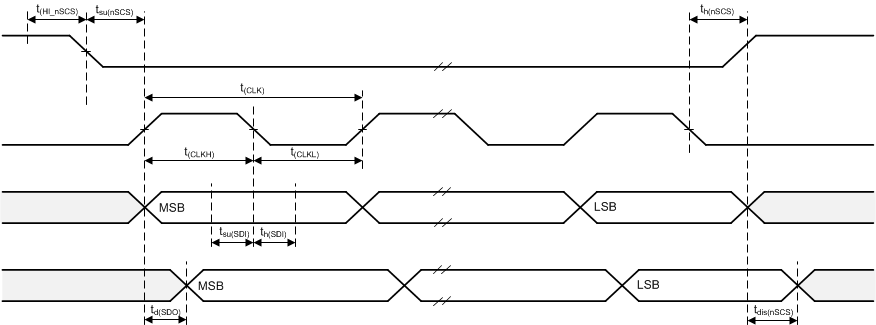JAJSFZ9B October 2017 – January 2021 DRV8873-Q1
PRODUCTION DATA
- 1 特長
- 2 アプリケーション
- 3 概要
- 4 Revision History
- 5 Pin Configuration and Functions
- 6 Specifications
-
7 Detailed Description
- 7.1 Overview
- 7.2 Functional Block Diagram
- 7.3 Feature Description
- 7.4 Device Functional Modes
- 7.5 Programming
- 7.6 Register Maps
- 8 Application and Implementation
- 9 Power Supply Recommendations
- 10Layout
- 11Device and Documentation Support
- 12Mechanical, Packaging, and Orderable Information
パッケージ・オプション
メカニカル・データ(パッケージ|ピン)
- PWP|24
サーマルパッド・メカニカル・データ
- PWP|24
発注情報
6.6 SPI Timing Requirements
| MIN | NOM | MAX | UNIT | ||
|---|---|---|---|---|---|
| t(READY) | SPI ready, VM > V(UVLO) | 1 | ms | ||
| t(CLK) | SCLK minimum period | 100 | ns | ||
| t(CLKH) | SCLK minimum high time | 50 | ns | ||
| t(CLKL) | SCLK minimum low time | 50 | ns | ||
| tsu(SDI) | SDI input setup time | 20 | ns | ||
| th(SDI) | SDI input hold time | 30 | ns | ||
| td(SDO) | SDO output delay time, SCLK high to SDO valid, CL = 20 pF | 30 | ns | ||
| tsu(nSCS) | nSCS input setup time | 50 | ns | ||
| th(nSCS) | nSCS input hold time | 50 | ns | ||
| t(HI_nSCS) | nSCS minimum high time before active low | 500 | ns | ||
| tdis(nSCS) | nSCS disable time, nSCS high to SDO high impedance | 10 | ns | ||
 Figure 6-1 SPI Slave-Mode Timing Definition
Figure 6-1 SPI Slave-Mode Timing Definition